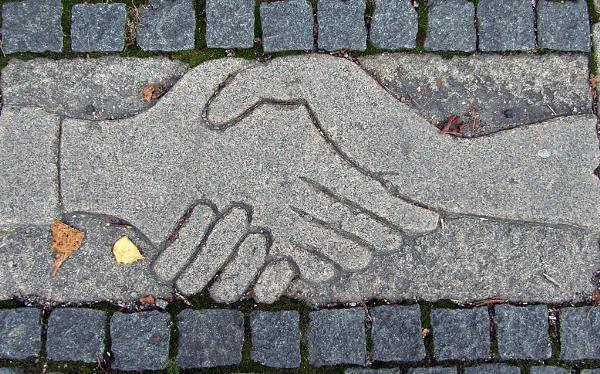This month’s special assembly for Africa of the Synod of Bishops is taking the theme: ‘The Church in Africa at the Service of Reconciliation, Justice and Peace – “You Are the Salt of the Earth ... You Are the Light of the World.”’ Marcel Uwineza SJ asks if the task of reconciliation might become clearer in light of the work of philosopher Gabriel Marcel.
When one looks at the recent histories of countries such as Zimbabwe, Sudan, Somalia, Burundi, Kenya, and Nigeria, one cannot help but ask why there continues to be such conflict and tragedy on the African continent. The second Synod of Bishops on Africa that began last week focuses on the themes of reconciliation, justice and peace, but what form will the discussions take? This article will draw on the ideas of Gabriel Marcel (1889-1973), a French, Christian, and existentialist philosopher,and demonstrate how his thought may provide the building blocks for such discussions and for the reconciliation that is so urgently needed if we are to build a harmonious society in which each citizen’s voice is heard. This article will seek to rethink how the Church is to fulfil the mission of reconciliation that will be emphasised at the synod.
The situation in Africa
On analysing the situation in some parts of Africa, one realises that the task of bringing peace to the continent is more urgent than ever before. There are numerous, tangible examples that point to this need.
Zimbabwe’s politico-economic crisis has forced thousands of people to migrate to neighbouring countries such as South Africa, Namibia, and Botswana. Those who remain in the country live under threat and fear. When one understands how government authorities have silenced the issue of Gukurahundi – the atrocities of Mugabe’s government towards the people of Matabeleland – one surely comprehends that reconciliation must be the most urgent concern for Zimbabwe’s Church today. Similarly, the tragedies of Murambatsvina, the destruction in 2005 of all houses which were not built according to Harare city planning, which left many poor Zimbabweans without shelter, demonstrate how an oppressive regime can drive away its own people.
Likewise, on analysing the problems in the Democratic Republic of Congo, we see how greed, foreign invasion and mismanagement of resources have led this country into poverty. We encounter in Rwanda the tragedy of a systematic killing, a genocide that took the lives of more than 800,000 Rwandans in 1994, mostly Tutsi who were killed simply because of who they were. We cannot forget the crisis in Darfur, where thousands of people are dying because of lack of proper dialogue between the Sudanese government and those in the southern part of Sudan.
We see the atrocities committed in the northern part of Uganda where many Ugandans lost their lives, relatives and property because of the greed for power and lack of vision shown by the rebels. The post-election violence in Kenya in 2008 was another tear in the flesh of Africans, as many people lost their lives because of ethnic discrimination fuelled by greedy politicians. These examples prove beyond doubt that the Church’s agenda must focus on reconciliation, justice and peace.
Selfish treatment of others – which includes clinging to power, accumulation of wealth, corruption, tribalism and a refusal of dialogue – is in opposition to the Church’s social teaching, which emphasises the intrinsic dignity of each person and the search for the common good. For there to be progress of all people, there must be an enabling environment in which people feel secure, both in themselves and with their neighbours. This environment must promote hospitality, true presence and availability to others. In Populorum Progressio, Pope Paul VI says that there cannot be progress if ‘a small restricted group enjoys a refined civilisation in a certain region, [while] the remainder of the population, poor and scattered is deprived of nearly all possibilities of personal initiative and of responsibility and oftentimes even its living and working conditions are unworthy of the human person.’[1] We can define progress to mean seeking out what makes life really human. ‘It means a whole people setting off bravely to find their fulfilment.’[2] Accordingly, ‘Catholics must cease their separateness, and join in public life to bring change from within.’[3] This is how the call for the common good must be understood.
This urgent call can only be heard, understood and acted upon when people are able to take time for themselves and ‘recuperate’. This ‘recuperation’ is an important step in the process of social change: Gabriel Marcel uses this word to show how change in attitudes comes about. He holds that recuperation and reconciliation are possible when an individual moves from a world of himself or herself to a world of us.
Reconciliation in the light of Gabriel Marcel
Being
Marcel’s understanding of our relationships with one another is rooted in his understanding of being. Being, he says, is not a means to an end; it is a foundation for all that we can conceive. It is the foundation of reality that transcends human efforts to characterise it. It ‘cannot be a property, since it is to be that makes possible the existence of any property at all; it is that without which no property can be conceived.’[4] Being can be understood asa whole of which a reality is part. Marcel affirms that all people are related in their reality when he says: ‘no man, however enlightened and holy he is, can ever arrive until the others, all the others, have started out to follow him ... we never climb alone, though we often seem to do so. The solidarity of all men is ineradicable, and their spiritual destinies are interlinked.’[5]
‘[Being] does not allow itself to be dissolved by the dialectics of experience.’[6] It stands firm against the trials of life when one has a why to live for. Marcel calls this ‘ontological exigency.’ The necessity of being is not a simple desire or vague aspiration. Rather, it is ‘a deep-seated urge … the exigency that is seated in me.’[7] Consequently, we are endowed with intrinsic dignity, as are all other people, whose being is a part of our own, and vice versa. Marcel writes: ‘the more exclusively it is I who exists, the less do I exist; and conversely the more I free myself from the egocentrism, the more do I exist.’[8] This is similar to Saint Paul’s message: ‘for you were called to freedom, brethren; only do not use your freedom as an opportunity for the flesh, but through love be servants of one another’ (Gal 5: 13). Marcel echoes the same idea again when he says: ‘to love is to embrace the being of the other as a being, not as an object to be used for one’s interests.’[9]
Being over having
So how does Marcel’s understanding of ‘being’ relate to the African reality?[10] In her mission, the Church needs to reemphasise Marcel’s message that, ‘to abandon what I am and become what I have is to be reduced to a thing.’[11] Some parts of Africa are ‘broken’ today because they have lost the sense of ‘being with’ and the importance of togetherness. Marcel goes on to contend that: ‘the idea of any real community becomes more and more inconceivable.… we are living in a world in which the proposition “with” seems more and more to be losing its meaning.’[12] We are living in an age of materialism where many people’s goal is to amass more and more property, and an age of globalisation where states tend to be valued according to what they can offer to the global market. Marcel argues that having sometimes has ‘a tendency to destroy and lose itself in the very thing it began by possessing, but which now absorbs the master who thought he controlled it.’[13] This brings a feeling of insecurity as one says: ‘if I lose what I have, who am I? Who will I be?’[14] One is afraid to love because love invites one to share what one has, for to love is to care, and to be generous.[15]
In a culture in which one can speak of someone ‘being worth a million dollars, how can there be an alternative between having and being?’[16] The church must reiterate that what people have does not replace who they are. A person is more than what they have. Having things is good, but one ought to detach oneself from them to reach out to others to help them live a meaningful life. As Pope Paul VI notes:
It is not just a matter of eliminating hunger, nor even of reducing poverty. The struggle against destitution, though urgent and necessary, is not enough. It is a question, rather, of building a world where every man, no matter what his race, religion or nationality, can live a fully human life, freed from servitude imposed on him by other men or by natural forces over which he has no sufficient control; a world where freedom is not an empty word and where the poor man Lazarus can sit down at the same table with the rich man. This demands a great generosity, much sacrifice, and unceasing effort on the part of the rich man who is [reconciled with himself and others to see their beings as ends in themselves.][17]
Marcel’s supremacy of being over having is in opposition to the attitude of the rich man that Jesus mentions in Mark 10: 17-23. This rich man wants to follow Jesus but he is ‘enslaved’ by his possessions. When he is told to go and sell them, he is depressed. The question he asks himself is indeed Marcellian: ‘if I lose what I have, who am I? Who will I be?’[18] What makes him sad is that he thinks that he is nothing if he has nothing. His having has overpowered his being. His identity is that of having, not of a person with intrinsic dignity that will of course remain even when he has lost his material property.
What does Africa have?
Various indicators confirm irrefutably the observation that there is a concentration of poverty on the continent of Africa. For instance, with regard to life expectancy: ‘the country with the highest infant mortality rate is Sierra Leone, with 165 per 1,000 live births (2004). The second highest rate is found in Liberia, with 157 per 1,000 live births. The country with the lowest total life expectancy, 35 years (2004), is Botswana, followed by Lesotho, 36 years, and Zimbabwe with 37 years. Average life expectancy in Sub-Saharan Africa is 47 years (March 26, 2007).’[19] Concerning population with access to safe water, ‘in sub-Saharan Africa, 42% of the population [was] without improved water in November 2004.’[20] Moreover, access to health services is also very limited and, ‘an estimated 24.5 million people were living with HIV at the end of 2005.’[21] According to UNESCO Institute for Statistics, for the years 2000-2004, ‘illiteracy is most prevalent in developing countries. South Asian, Arab and Sub-Saharan African countries are regions with the highest illiteracy rates at about 10% to 12%.’[22]
And so the list could continue. Yet the paradox is that Africa is rich in resources such as minerals and oil. The problem is that these resources remain in the hands of the few, the elite. It could be argued that Africa faces the problem of ‘having’.[23] The owners of these resources think that if they lose their properties and power, they are nothing. This includes some outsiders whose sole desire is to exploit Africa. The obsessive desire to have has made some Africans feel alien in their own continent. They are ‘others’ in their own ‘houses’. This could explain the current migration of many Africans who flee their home countries for greener pastures in the West. Some Africans feel treated as means to the ends of the elites who own the means of production. We need to envisage strategies that can help overcome the above problems. Could the Marcellian concept of the supremacyof being over having be a tool to change attitudes towards reconciliation?
The task in Africa
As we have discussed, shifting the focus from having to being is a step towards restoring right relationships, as it turns attention away from ourselves and towards others; it allows us to have the generosity that is required in order that we might give of ourselves to others. With this mentality, we can move towards fixing broken relationships through the process of reconciliation, which requires work from all sides. Of the injured party is required a spirit of forgiveness; of the wrongdoer, a wholehearted recognition of his offence against his brother and acknowledgement of this in word and deed.[24] The combination of these two brings about the restoration of personal friendship and brotherly good feeling. There cannot be reconciliation without forgiveness: it can only happen when the injured party and the one who has wronged shake hands. Neither feels superior to the other; rather they seek what brings happiness to one another. This makes reconciliation a lived virtue. It thus embodies first and foremost a way of life, rather than an ideology to be imposed on other people. In his homily on the opening day of the Second African Synod in Rome, Benedict XVI said of reconciliation that it is ‘a gift from God which people should implore and receive. It is a stable foundation on which peace is built, an indispensable condition for authentic progress of people and the society.’[25]
When the continent faces such huge problems, how can we begin to set an agenda for the Church in Africa by which the intrinsic dignity of each person is honoured? Africa needs politicians and heads of state who inspire others, people who wish to serve rather than to be served: people who ‘aspire to inspire before they expire.’ ‘It is our duty to work for the restoration of dignity and promote brotherhood. There is a need to hold in check the lust for hegemony, both internal and external, which usually sows the seeds of division and dissension.’[26] The Church needs to review its evangelisation model to let African leaders understand the words of Jesus: ‘among the Gentiles it is the kings who lord it over them, and those who have authority over them are given the title Benefactor. With you this must not happen. No, the greatest among you must behave as if he were the youngest, the leader as if he were the one who serves.’ (Luke 22: 25-27)
In all her efforts, the church needs deeply committed Christians, not those who had means to change things and never did it; she does not need ‘subordinated Christians’ who use their Christianity for their convenience.[27] She needs people who work inexorably and redouble their efforts to change the lives of their fellow brethren who are suffering from hunger and poverty. She needs people who say: ‘I will not cease my activities while Africa … still continues the struggle and I will go on with my task until my dying day.’[28] The agenda of reconciliation is such that until it is achieved, the state of emergency in which we live is not an exception but a rule. It demands that all commit themselves to promoting the kingdom, otherwise there will be no pity for those people who, ‘possessing the exceptional privilege of being able to speak words of truth … have taken refuge in an attitude of passivity, of mute indifference, and of cold complicity.’[29]
The Church must call for the move from a world of himself or herself to a world of us. It must deconstruct the laager mentality that is expressed by many of Africa’s leaders through nepotism, regionalism, corruption, and tribalism. Only then can we have a multicultural society in which the recognition of others partly shapes our own identity,[30] and a community of loyalty where everyone feels that others are doing their part.
Conclusion
Undoubtedly, reconciliation remains a critical goal both for the Church and Africa today. In the words of Schreiter, reconciliation is a ‘new mission in a new century.’[31] Man has become a question for man: many of Africa’s problems result from the fact that some people’s being or identity has been overpowered by others’ overwhelming desire to have. This is because the concept of duty is losing its meaning in a postmodern era where almost everyone is becoming their own foundation. What should the Church do and how should she do it? Philosophers such as Gabriel Marcel provide ways in which the task of reconciliation may be understood and consolidated by all people of good will, but in the meantime we await with great expectation the outcome of the Synod of Bishops on Africa.
Marcel Uwineza SJ is a Jesuit scholastic studying at the Jesuit School of Theology, Hekima College, Nairobi.
This article is a revised version of an article published in Chiedza: Journal of Arrupe College,Issue 1, Vol. 10 May 2007, pp.31-44.
[1] Paul VI., Encyclical Letter Populorum Progressio. (1967), #9.
[2] Bogan, R. V., This is Progress: a Creative New Translation of Pope Paul’s Encyclical, Progress of Peoples. (Chicago: Claretian Publications, 1968), p. 5.
[3]Vallely, Paul., The New Politics: Catholic Social Teaching for the Twenty-First Century. (London: SCM Press, 1998), p. 9.
[4] Marcel, Gabriel., The Mystery of Being: 2. Faith and Reality. Trans. René Hague. (Chicago: Regnery, 1960) p. 30.
[5] Marcel, Gabriel. Being and Having: An Existential Diary. Trans. Katherine Farrer. (New York: Harper and Row Publishers, Inc., 1965).
[6] Marcel, Gabriel., Metaphysical Journal. Trans. Bernard Wall. (Chicago: Henry Regnery Company, 1952), p. 183.
[7] Marcel, Mystery 2, p. 37.
[8] Marcel, Mystery 2, p. 34.
[9] Marcel, Being, p. 162.
[10] I use this word African to reinforce that the kingdom of ends and the idea of being are still to be realized in Africa. It demands a personal involvement from each African citizen.
[11] Marcel, Gabriel.Etre et Avoir. (Paris: Editions Montaigne, 1935), p. 196.
[12] Marcel, Gabriel., The Mystery of Being: 1. Reflection & Mystery. Trans. G. S. Fraser. (Chicago: Regnery, 1960), p. 34.
[13]Marcel, Being, p. 164.
[14]Ibid., p. 162.
[15] Marcel, Gabriel. Man Against Mass Society. Trans. G. S. Fraser. (Chicago: Regnery, 1962). p. 156
[16] Fromm, Erich. To Have or To Be? (New York: Harper and Row Publishers, 1976), p. 15.
[17]Paul VI., Populorum Progressio #47
[18]Marcel, Being p. 162.
[19] HIV and AIDS in Africa http://www.avert.org/aafrica.htm accessed March 29, 2007
[20] Water, Sanitation, and Hygiene links to health. November 2004. http://www.who.int/water_sanitation_health/publications/facts2004/en/index.html Accessed March 30, 2007
[21] Ibid., HIV and AIDS in Africa.
[22]Literacy Rate
http://www.uis.unesco.org/TEMPLATE/html/Exceltables/education/Literacy_Regional_April2006.xls Accessed March 30, 2007.
[23] This is an important point since it illustrates that Africa does not lack resources. There is a poverty of ‘obsessed having.’ There is a certain tenacity of what the few have. The majority of the population cannot access it because it is concentrated in the hands of the few. Africa has many intellectuals who are capable of redeeming it from its current predicament, yet they are driven away by some of their governments, who do not allow them to feel at home. Their tiny salaries are a clear indicator of this fact, and part of what the civil servants are supposed to get as a remuneration ends up in the pockets of some elites through corruption.
[24] Hasting, James. Encyclopedia of religion and Ethics. Vol. VI (New York: T. and T. Clark, 1913), p. 82.
[25] Benedict XVI, ZENIT, Le monde vu de Rome. Service Quotidien - 04 October 2009.
[26] Orobator, A. E., The Church as Family: African Ecclesiology in Its Social Context. (Nairobi: Paulines Publications, 2000), p. 60.
[27] Kaulemu, David., “Christian Responses to the Crisis in Zimbabwe.” Chiedza: Journal of Arrupe College. Vol. 9 No. 2 (December 2006), p. 88.
[28] Macey, David., Frantz Fanon. (New York: Picador USA, 2002), p. 4.
[29] Fanon, Frantz., Toward the African Revolution: Political Essays. Trans. Haakon Chevalier. (New York: Grove Press, 1964), p. 102.
[30] Taylor, Charles., Multiculturalism: Examining the Politics of Recognition. Ed. Amy Gutmann. (Cambridge: Harvard University Press, 1994), p. 25.
[31]Schreiter, Robert J., “Globalisation and Reconciliation.” Mission in the Third Millennium. Ed. Robert Schreiter J. (New York: Orbis Books, 2001), p. 121.






